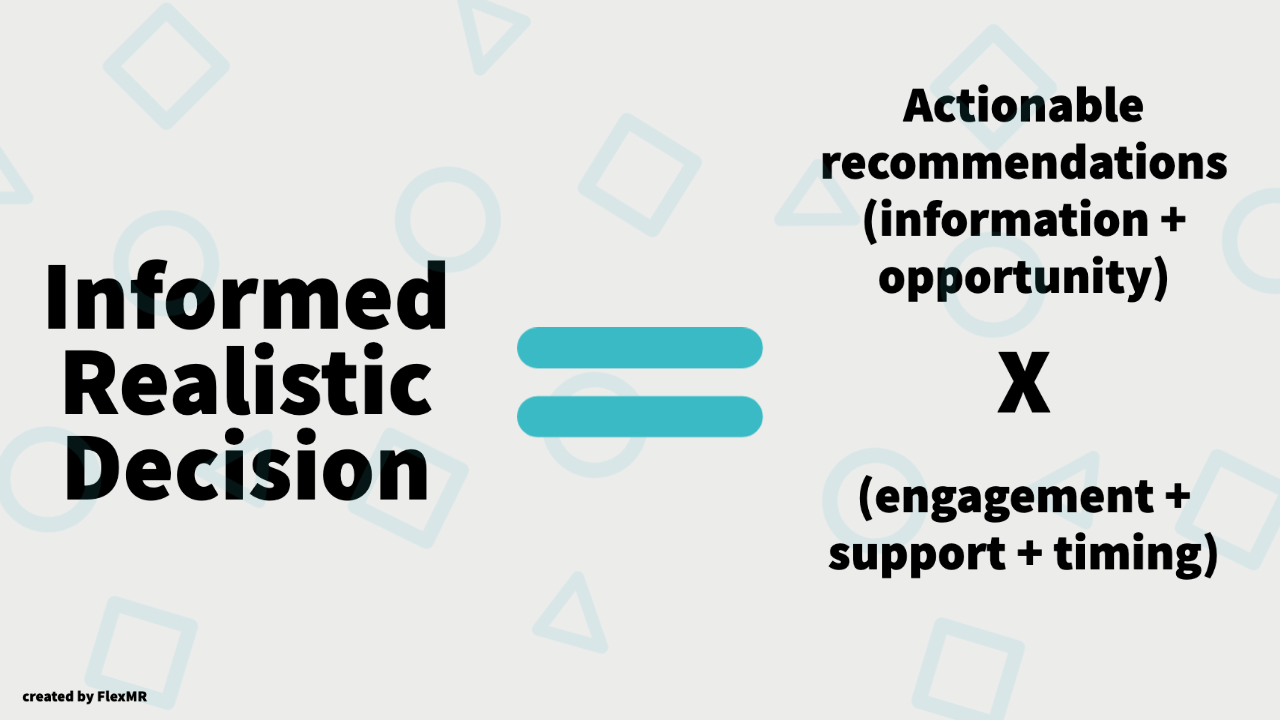Decision-making is a fickle, individual process, which is built up on a foundation of environmental and human factors. When it comes to decision-making in a business, stakeholders have a lot of different factors to take into account, such as business objectives, team strategies and current resource allocations, as well as their own unique personal contexts. So with all of these factors at play, how do we impact the stakeholder decision-making process effectively enough to influence their decisions with quality insights?
This is what our attendees discussed at FlexMR’s latest in-person roundtable on 16th February 2023. Our Chief Sales Officer, Maria Twigge, hosted five insight experts from four different industries to explore their approaches to stakeholder engagement and intercepting their decisions. Those attendees were:
- David Packingham, Market Research and Analysis Officer at Birmingham City University
- Maria Callaghan, Insight and Research Manager at Hallmark Cards and ASDA
- Sy-Anne Holden, Shopper Insight Manager at Hallmark Cards
- Dr Katharine Johnson, Client Success Manager at FlexMR
- Joanna Gray, Product Consultant at FlexMR
Thank you to all who attended this roundtable - everyone contributed valuable experience-based insights and helpful tips and tricks we will no doubt all use in the future to help better inform our stakeholders. It’s a tricky topic with each situation requiring a unique solution, but it’s always valuable to learn from other experts in other industries to share new ways of working well.
| Tweet This | |
| Decision-making is a fickle, very individual process, built on a foundation of context - so how can insight experts influence stakeholder decision-making with insights? |
Activating Data in a Business
Who’s responsibility is it to activate data in a business?
This was one of the first questions Maria put to the group, and it is a very pertinent question that is highly debated in many industries. But the correct answer to this, is everyone. While stakeholders are the obvious answer, insight experts shouldn’t relinquish responsibility over the data activation easily, especially since it’s their job to report the data in such a way that it makes it easy for stakeholders to understand and activate insights.
Sy-Anne stated that they have very creative audiences so they need to do lots of pictorial reporting, but this part of the discussion kept coming back to how insight experts need to understand the stakeholder audience to determine how to present those valuable insights to them and understand which reporting formats to use at any one time. For example, those presenting to finance-based stakeholders would use a different approach to those presenting to stakeholders in the creative industries. Our attendees also noted that the decision also depends on whether or not it’s an internal or external presentation.
With the different reporting styles needed for different audiences, there comes a need for insight experts to hone different skills in order to create the best report possible in those formats.
Engaging Stakeholders
While insight experts are used to trying to make the research process easier for stakeholders, are there times where we need to being more challenging? Our attendees discussed the benefits and challenges of being more challenging at the start of a brief, working to understand factors such as the size of the market, the size of the opportunity, the purpose of the question/research, etc.
Maria and Sy-Anne mentioned that they have a template and validation form for stakeholders to complete prior to requesting any research for new insight. It ensures individuals make requests only when required and during the request process it makes stakeholders actively consider the reasons for their request. This detail will always work to enhance the research experience, help stakeholders better define research objectives and allow insight experts to design a truly impactful research project that is fit for purpose.
Throughout this part of the roundtable, there was a lot of discussion about the role of gut instinct in decision-making processes, with most of our attendees noting that they’ve recognised too many decisions within their businesses were often placed on gut instinct rather based off insights generated from consumer research. It was certainly made clear that insight isn’t seen as a definitive answer, but rather just a steer in the right direction.
This discussion drew on aspects of System 1 verses System 2 thinking, although it was agreed that usually these both work together, and often individuals will look to System 2 when System 1 results in any conflicts in the decisions that need to be made. Ultimately, when making decisions, and gathering at the relevant information, insight experts should stress the importance of identifying the alternative paths and understand the next best decision if the first option is not viable.
Throughout all decision-making processes, insight experts will naturally encourage their stakeholders to use the information, insights or data that they deliver to ensure the stakeholder makes the best decision at the time - but does that put the responsibility of activating data more on insight professionals when it should be more on stakeholders?
When it comes to gaining the right insights for stakeholders to make the best decision, David stated that they often try to use unprompted questions first, before prompted questions to ensure the resulting insights generated aren't misleading. For example, insight experts should ask what hobbies do people undertake in the first question with an open text answer option, and then asked what type of cards they like to buy from the sporting section to gain deeper insight into people like and why.
| Tweet This | |
| At the latest FlexMR Roundtable, insight experts from a myriad of industries came up with a great equation that will help influence stakeholder decision-making processes. |
If we had asked the type of sports first, and then what hobbies do they enjoy, it puts us in danger of prompting some expected answers. Maria Callaghan mentioned that Hallmark stakeholders use insight-led creativity a lot, and as such their stakeholders need the data in a particular format to make the best interpretations possible from the insights available.
Factors Leading to Insight-Led Decisions
There are many factors that determine whether stakeholders will use insight within their decision-making. Everyone attending the roundtable agreed that building trust internally was a key factor in insights being used in decision-making across a business. Both Birmingham City University and Hallmark have insight planning groups and insight champions within their business, and everyone recognised that cross team collaboration is key to making sure insights are distributed further.
It was also universally agreed that insight experts need to identify the problem that needs to be solved before they can fully understand the question stakeholders want to ask respondents first; then we can work on gathering the relevant information to identify any alternatives courses of action before making a final decision.
Maria Twigge then put to the group an important question, would our attendees ask stakeholders to consider the consequence of what would happen if they don’t take an insight-led decision? And if so, how?
The representatives from both Birmingham City University and Hallmark stated that they usually frame their questions to stakeholders in a more positive way, and try to show the impact of data on decisions showing how it benefits from insights rather than ask them to consider the alternative where they rely on gut feeling and make the wrong decision.
The Insight Alchemy Equation
The group then looked at creating an alchemical equation that provides a decision maker with everything they need to make an informed choice. It was thought that ‘information + opportunity (for customers and stakeholders) + action and recommendation’ would be essential within the formula. After some great discussion, they came up with the following:

All attendees noted that it was also important to provide engagement and support along with the recommendation. For example, the attendees from Hallmark explained that their data they needed to communicated stated that customers wanted non-clinging film wrapped around their wrapping paper, but for manufacturing purposes, this wasn’t a viable option. Therefore, Hallmark had to look at the next best alternative option.
This goes to show that any recommendations presented to stakeholders need to take into account the company as well as the customer. There will always be contextual information such as this that informs the formation of actionable recommendations. Other example of this to take into account includes any financial and brand considerations that might be impacting the decision-making process.
At the end of the day, any informed decisions need to be achievable and realistic; they should consider any return on investments in the information part of the equation as well as any external marketing conditions that could be influencing the decision.
To drive decision-making internally, innovating throughout the whole process rather than just at the start was found to be an important course of action. This innovation could take many forms and impact any and all parts of the equation, from the communication channels used to the support networks in place.
Once a decision has been made, a review of it’s success and why can unlock the key to successful decision-making in the future. But due to time implications, reviews such as these are often difficult to conduct, and also to measure since there is usually lots of variables of why a decision may succeed or fail. One of the best metrics discussed was internal stakeholder satisfaction.


















